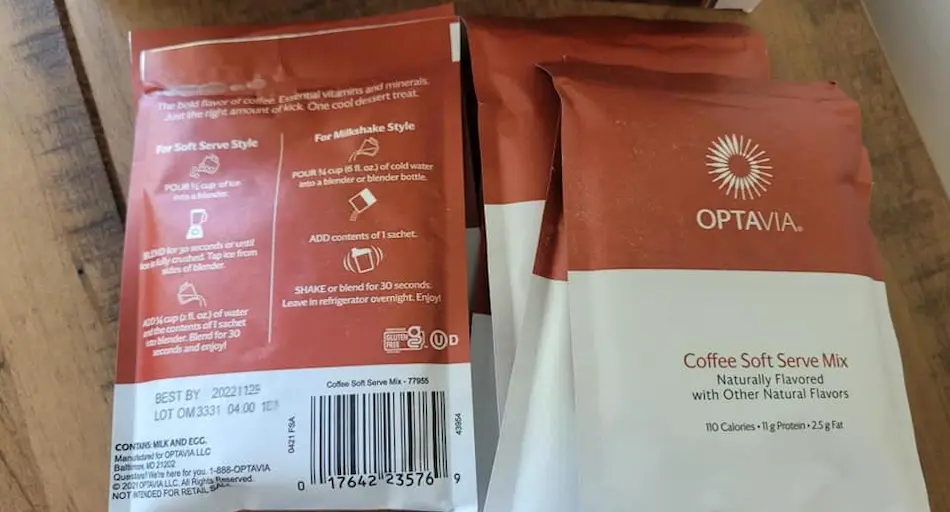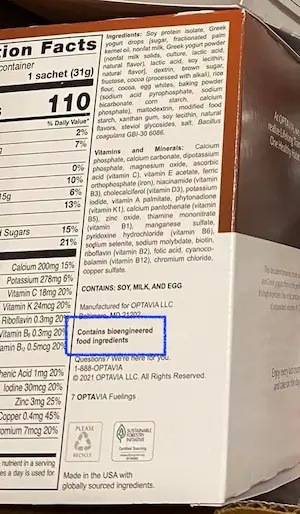I have been overwhelmed with the number of products in the health food market that have a variety of labels such as GMO-free, organic, and natural.
So many options make it hard for me to know exactly what I’m buying when I reach for an apparently healthy option.
If you’re asking yourself if Optavia is an all-natural product, this article is for you.

First, let’s talk about bioengineered food ingredients
When you go to the grocery store, I’m sure you’ve seen food with writing on it that says things like “no GMOs” or “contains bioengineered ingredients”.
Until January 1, 2022, manufacturers could choose whether to share (or not) this information.
Starting January 1, 2022, there have been new rules about how foods that are bioengineered or contain bioengineered ingredients must tell people this information.
According to the United States Department of Agriculture (USDA), “if an ingredient is made from a food that has been changed using genes, then it is considered a bioengineered food ingredient and does require a bioengineered food disclosure.”
So what is GMO and is it safe?
I know that “GMO” and “bioengineered food” can be a bit tricky to understand.
Especially because they are similar (but not exactly the same).
In general, a GMO is a living thing that scientists have changed in a lab.
This can include plants, animals, and even tiny microorganisms.
Scientists change GMOs to make them do certain things, like not getting eaten by bugs or making more food.
Bioengineered food is food that is made from these changed things.
When it comes to safety, the National Academy of Sciences says that bioengineered foods do not pose special health risks.
This means they are safe to eat and will not make you sick.
According to U.S. Food and Drug Administration, GMO foods are as healthful and safe to eat as non-GMO foods.
Some GMO plants have been changed to make them more nutritious.
For example, “GMO soybeans have healthier oils that can be used instead of oils with trans fats,” states the FDA.
Since GMO foods were introduced in the 1990s, research has shown that they are just as safe as non-GMO foods.
Additionally, research shows that animals fed GMO plants are just as healthy as animals fed non-GMO food, according to FDA.
“GMO foods are studied a lot before they are sold to the public.”
This is to make sure that they are safe to eat, just like the foods we currently eat.
The FDA states that “GMOs do not affect people differently than non-GMO foods.”
Does Optavia have GMO?
Yes and no.
While none of the Select Fuelings contains any GMO or BE ingredients, all of the Optavia Essential Fuelings have genetically modified ingredients.
Since June 2021, the company started to adhere to GMO regulations and disclose information about BE food and BE food ingredients on their product packaging.
According to the Optavia Product Enhancements article:
“The new standard requires food manufacturers, importers, and other entities that label foods for retail sale to disclose information about BE food and BE food ingredients.”
“This rule is intended to provide a mandatory uniform national standard for the disclosure of information to consumers about the BE status of foods.”
Keep in mind that this new regulation didn’t require Optavia to reformulate their Fuelings with BE ingredients.
It simply means that they are now required by law to disclose information about their products that contain genetic material that has been modified.
In other words, not all of Optavia’s products are truly natural as they may have been using GMOs before but haven’t disclosed that information.
How Optavia displays BE ingredients disclosure?
Optavia displays the BE ingredients information by providing a statement on their product packages – “Contains bioengineered food ingredients”.
Here’s the photo.

Keep in mind that non of the fueling has the same information.
You can only find this statement on the back of the Optavia box.
Which Optavia’s ingredients are bioengineered?
Optavia didn’t disclose which ingredients are bioengineered in their Fuelings.
The United States Department of Agriculture (USDA) has recognized a few foods that have been bioengineered and want consumers to be aware of their presence in the marketplace.
These biotech-based products include:
- alfalfa
- apple (Arctic varieties)
- canola
- corn
- cotton
- eggplant (BARI Bt Begun varieties)
- papaya (ringspot virus-resistant varieties)
- pineapple (pink flesh varieties)
- potato
- salmon (AquAdvantage)
- soybean
- squash (summer)
- sugarbeet
According to Optavia Fueling ingredient list, the most common elements found in their products are canola oil, soy protein isolate, and corn starch, but it’s not clear if these were genetically modified.
How does Optavia address the issue of GMOs?
I haven’t seen Optavia taking any steps to address the use of genetically modified organisms (GMOs) and their potential impact on the environment.
Optavia mentions that they have 40 years of experience in developing weight loss products and programs.
According to their website, they use quality, tested ingredients to support their customers’ health.
However, they do not directly address their stance on GMO usage or their approach to protecting the environment.
Instead, they cite websites, such as FDA, EPA, and USDA that provide information on Bioengineered foods which have been available to consumers since the early 1990s.
Optavia states:
“The U.S. Food and Drug Administration (FDA), U.S. Environmental Protection Agency (EPA), and USDA have collaborated to guarantee that crops developed through genetic engineering are safe for human consumption, animal consumption, and the environment.”
